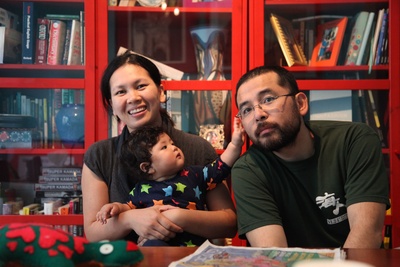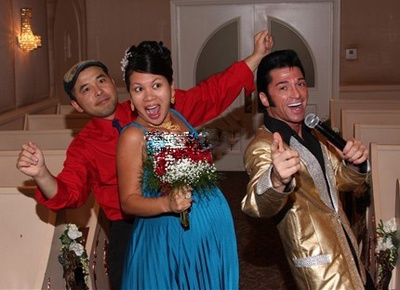Once upon a time, there was such a thing as the Bubble Economy. No one was aware of it while it was around. Then everyone started calling it “Baburu” only after it had supposedly popped and disappeared without a trace. It was in reference to the economic growth of the 80's in Japan. In the later part of that decade, Japanese corporations got so lush with dollars they were able to buy the pride of America: the Hollywood studios. There were many media backlashes to this action. Some Japanese cultural figures even forewarned of such a bold move as being out of our class and too arrogant against our good American friends. In reality, it was merely a rational business step; the world’s largest home video manufacturers acted on their long-term interest to secure access to Hollywood studio libraries. But it was virtually unfathomable for most of the common Japanese folks. For us it meant being the boss to those blond, blue-eyed Hollywood actors, whom we only knew to admire on our knees and faint. I remember, as a Japanese high school teen, I wanted to apologize to my American Mormon missionary friends, who used to host bi-weekly English conversation classes at a nearby community center. Half of them said I should not feel that way. The other half was elated that I felt that way.
The evidence of Japanese arrogance against Americans was everywhere on Japanese TV news. We watched Japanese motorcycles get torched in a parking lot by American auto factory workers. We watched American politicians in capital hill whack at a Japanese boom box with sledgehammers. These politicians were ticked off when they learned the same brand electronics maker exported some classified device to the Soviet Union. The forbidden device enabled the evil communists to carve underwater propellers with fancier contours, making the detection of nuclear subs tougher. The whacking was spectacular and intuitive, but the evil of the deed was difficult to explain to the TV viewing public. I mean, really, who cares about the contours on propellers? The hydrodynamic diagrams of underwater propellers were soon forgotten, but the whacking and flying pieces of plastic gave us a lasting impression of who we were to them. We were getting arrogant and we had to be punished. And we knew that’s how the Americans saw it. I watched as the Japanese people took those punishments with confusion, a sense of guilt and a quiet anger. In the meantime, every hard-working Japanese man thought we were gonna take it to the top. It was a fact. We had the highest GDP or GNP or whatever the measurement was to indicate the productivity of its citizens. Many old timers I knew bragged that we finally won the “war”, as if it had never ended. Along with these old timers, the whole nation was consuming beer at an unprecedented rate.
The first Lexus was about to roll out of the production line. Honda was about to introduce this sleek sports car made largely of aluminum. At the Maharaja Club in Tokyo, young Japanese women were dancing their butt off in tiny skirts on the bar counters, waving decorative Japanese fans in their hands. This was the backdrop of my coming to the States. Thanks to this economic growth, it became realistic for a regular Japanese family like mine, where the mother finished only nine years of schooling, to send their son to a U.S. college. The cost became comparable or even lower to that of sending a child to a private college in Japan. Thus I left and landed on the shores of California in 1990. In the same summer, Saddam Hussein invaded Kuwait and the bubble popped, starting the ten years of rather isolated economic stagnation in the island nation I call home.
In the summer of 1990, I found myself thousands of miles away from my parents. I was eighteen. I thought it was the best time of my life. But soon I realized there were certain really annoying barriers along the ethnic lines within the American culture, and there was even a clearer barrier between the Americans and the foreigners. To my disappointment, I had to accept that I was not viewed as an individual, but more as a member of a bigger entity like race or nationality, and with the label came huge loads of baggage. I should have known better. Didn’t I watch them burn the motorcycles? My fantasy of hanging out with cool black and white American kids proved to take a much longer time. But I immediately found myself in the middle of another fabulous community, the flock of international students.
The international student body was largely made up of Asian kids like myself, which was a little disappointing to be honest. I mean, hanging out with Asian people was not exactly my Japanese idea of being cool. But I got over it quickly and started making friends. I never apologized to Americans after that one conversation with the Mormons, but I began to apologize to Asian international friends as I got to know them well. The history of Japanese imperialism against our neighbors had been a big thorn in my sense of identity throughout my teen years. It still haunts me today. The lack of interest in history amongst my high school friends only added to my frustration. My generation of Japanese kids used to be called “Shin-jin-rui” by the media. It meant “new human species”. One of the characteristics of this new species was their utter lack of interest in history and politics, unlike our predecessors from the 60s and 70s. We were also known to be irresponsible, selfish, vain and hopelessly spoiled. So when I made friends from other Asian countries, I just had this pent-up urge to talk about this blood-drenched part of our Asian history. I wanted to hear their anger. I wanted to bridge the gap. I wanted them to know that not all Japanese people were assholes. At least, I was not one.
I was not an imperialist jerk and I could prove it; I had a street credit. I once attempted to burn the Japanese flag in my high school senior year. It was merely an attempt because I had no lighter on me that morning. It was the day when Hirohito died. He expired without ever showing any regret in regards to what he did and did not do as the emperor before and during World War II. My communist friend (the only one in the whole school) and I strayed from the path of orderly exit after the all school rally and went to the half-staff flag posted at the gate. The country had been in a somber mood for almost a year after Hirohito fell seriously ill. “Jishuku” became the word of national unity, like 9/11. It meant “voluntary refrain”. Corporations stopped hosting cherry blossom picnics. Many schools postponed trips for their graduating seniors. All this happened due to this unspoken social pressure to display a sense of “Jishuku”, the voluntary refrain. The whole thing was very Japanese and the phenomenon scared the hell out of me. It reminded me of the Japanese population’s mentality, which allowed the ultra-nationalists to run amok before and during WWII. Anyways, I had already been agonized by this “Jishuku’ atmosphere for ten months prior to the imperial departure. So on that morning, my communist friend and I took the flag off the post and left it on the ground. We were very scared during our action that lasted probably less than a minute because there was an office of an ultra-right wing organization just outside our gate. They let their presence be known by posting a crest of chrysanthemum, the Japanese imperial seal, on the window. They were like yakuzas. These organizations were funded solely for the purpose of terrorizing the general population against any leftist causes. I’ve heard of CIA involvement in launching these organizations in post-war Japan in order to deter the rise of a socialist movement. But much of the current funding was apparently coming from domestic ultra-nationalist capitalists. My friend and I were so scared of their presence that we probably could not have lit the flag even if we had a lighter. As soon as the flag hit the ground, we walked away quickly and quietly. It might have been a meek demonstration of civil disobedience but I thought it gave me a little street credit as to what I believed against.
I was starting my rampage of apology to Asian international friends. But bathing under the California sun, I realized most of my Asian international student friends did not really care about the history either, just like the “Shin-jin-rui”. I was an odd guy to bring up such a thing. They appreciated my apology but the dudes were more curious to learn how to say “You’re very sexy and I want to go to bed with you” in Japanese. It occurred to me that sleeping with Japanese women meant more to my wonderful Asian male international student friends than overcoming the sense of gap caused by the Japanese imperialism. And to my dismay, they came to the States thinking unanimously that all Japanese women were very pretty. It was the media influence. So I stopped apologizing and I did my best to help them find Japanese girl friends. It was not easy because most of the Japanese girls were busy chasing American white boys or any white boys in that matter. It was college. Everyone was horny regardless of his/her nationality or sense of history. Sex was the only politics that seemed to matter then.
I read recently in a newspaper that two of the Big Three automakers might not make it. As they prepare for bankruptcy this spring, I keep remembering the torching and whacking of Japanese products by angry Americans in the 80's. I wonder if this tragic downfall of the American auto industry was predestined by those acts of arrogance. In retrospect, the images echo like a curse.
When the global “Baburu” popped hard last year, coincidentally I went through another dramatic change in my life, just like 19 years ago. I got married in Las Vegas on the day Lehman Brothers went belly-up. Nine days later I was blessed with a beautiful child. I thought my summer in California was the best time of my life, but today, thanks to my beautiful wife and baby, I feel even more passionate about my life and my career in film-making. I did not choose it this way but these financial crises seem to provide a nice backdrop as I go through these life-altering experiences. I will warn you next time when I make big moves. You should take your money out of the stock market.
* * *
More information on Masahiro Sugano:
Eye From the Sky, Sugano's website: http://www.eyefromthesky.net/index.html
Sugano's film: http://www.secondmoonmovie.com/index.html
A TV interview on Chicago Tonight : http://secondmoonmovie.blogspot.com/
* * *
* This article was originally published in Voices of Chicago, online journal of the Chicago Japanese American Historical Society.
© 2009 Masahiro Sugano





